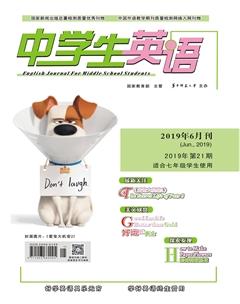新目标英语七年级(下)
Unit 9重点、考点预览
[一、重点词汇]
straight adj. 直的 adv. 直接地
curly adj. 弯曲的
tall adj. 高的
height n. 高度;身高
medium adj. 中等的
build n. 体型;体格
thin adj. 瘦的
heavy adj. 重的
glasses (pl.) n. 眼镜
handsome adj. 英俊的
actor n. 演员
actress n. 女演员
nose n. 鼻子
mouth n. 嘴
[二、重点词组]
look like 看起来像……
curly/short/straight/long hair 卷/短/直/长发
medium height/build 中等身高/身材
have a round face圆圆的脸
[三、重点难点分析]
1. What does your friend look like? 你的朋友看起来是什么样子?
“What does/do sb. look like?”用来询问某人的外貌特征,表示“看起来怎么样”。
例如:
What does your teacher look like? 你的老师长什么样子?
2. She has long straight hair. 她有着长长的直发。
描述头发时,要按照“先长短、后曲直,最后说颜色”的顺序来描述。
例如:
She has long curly black hair. 她留着黑色卷曲的长发。
3. He is tall and thin, and he has curly blonde hair. 他又高又瘦,并且有着金黄色的卷发。
sb. is+表示身高、体型等的形容词
=sb. is of+表示身高、体型等的名词
sb. wear(s)+衣服、帽子、鞋子、眼镜、手表、胡须等
例如:
He is tall and handsome. He has straight brown hair and he doesnt wear glasses. 他个子高、长相英俊,留着棕色的直发,而且不戴眼镜。
[四、语法讲解]
名词、形容词描述人的外貌(见本页第三部分重点难点分析第2、3条)
Unit 10重点、考点预览
[一、重点词汇]
noodle n. 面条
beef n. 牛肉
potato n. 土豆;马铃薯
special n. 特色菜;特价品;adj. 特殊的 would v.(表示意愿)愿意
large adj. 大号的;大的
order n. & v. 點菜;命令
size n. 大小;尺寸
bowl n. 碗
meat n. (可食用的)肉
dumpling n. 饺子
fish n. 鱼;鱼肉
pancake n. 烙饼;薄饼
world n. 世界
answer n. 答案 v. 回答
different adj. 不同的
cake n. 蛋糕
candle n. 蜡烛
age n. 年龄
blow v. 吹
candy n. 糖果
popular adj. 受欢迎的;普遍的
lucky adj. 幸运的
idea n. 想法;主意
[二、重点词组]
would like 想要
beef noodles 牛肉面
tomato and egg soup 西红柿蛋汤
a large/medium/small bowl 大碗/中碗/小碗
mutton noodles 羊肉面
green tea 绿茶
blow out 吹灭
cut up 切碎
make a wish 许愿
what size 什么尺寸
[三、重点难点分析]
1. What size would you like?
你想要多大尺寸的?
size在这里作名词,意为“尺寸、大小”。既可表示物体的大小,也可表示服装、鞋帽等的尺码。用what size引导的特殊疑问句,用来询问大小、规格等。
例如:
What size shoes do you wear?
你穿多大码的鞋子?
2. But we are short of fish.
但是我们缺鱼。
句中be short of 意为”缺少;缺乏”。
例如:
He is short of money now.
他现在缺钱。
[四、语法讲解]
would like的用法
would like意为”想;想要”,与want同义,但语气更委婉。其用法有:
1. would like sth. 想要某物
例如:
Would you like a cup of green tea?
你想要一杯绿茶吗?
2. would like to do sth. 想做某事
例如:He would like to see you today.
他今天想见你。
3. would like sb. to do sth. 想要某人做某事
例如:
What would you like me to do?
你想要我做点什么?
Unit 11重点、考点预览
[一、重点词汇]
milk v. 挤奶; n. 牛奶
cow n. 奶牛
horse n. 马
feed v. 喂养;饲养
farmer n. 农民;农场主
grow v. 种植;生长;发育
pick v. 采;摘
excellent adj. 极好的;优秀的
farm n. 农场 v. 务农;种田
flower n. 花
countryside n. 乡村;农村
yesterday adv. 昨天
sun n. 太阳
worry v. & n. 担心;担忧
luckily adv. 幸运地;好运地
museum n. 博物馆
fire n. 火;火灾
painting n. 油画;绘画
lovely adj. 可爱的
exciting adj. 使人兴奋的
expensive adj. 昂贵的
robot n. 机器人
slow adj. 缓慢的;迟缓的
cheap adj. 便宜的;廉价的
gift n. 礼物;赠品
fast adj. & adv. 快的(地)
guide n. 导游;向导
hear v. 听到;听见
interested adj. 感兴趣的
dark adj. 黑暗的;昏暗的
[二、重点词组]
go for a walk 去散步
milk a cow 给奶牛挤奶
ride a horse 骑马 feed chickens 喂鸡
talk with... 与……交谈
take photos 照相
last week 上周
show sb. around... 带领某人参观……
in the countryside 在鄉下 go fishing 去钓鱼
at night 在夜晚 the school trip 学校旅游
fire station 消防站
be interested in... 对……感兴趣
[三、重点难点分析]
1. It was so much fun. 这真好玩。
fun在此句中是名词,意为“有趣的事”,不可数。
例如:
The children are having so much fun. 孩子们玩得多么开心啊。
2. The rooms were really dark and it was difficult to take photos, so I didnt take any. 这些房间真的很暗,很难拍照,所以我没有拍到照片。
It is adj. for sb. to do sth. 意为“对某人而言做某事是……的。”
例如:
Its difficult for him to deal with the problem. 对他来说解决这个问题很难。
[四、语法讲解]
一般过去时态(上)
1. 一般过去时指的是过去某一时间发生的动作或存在的状态。常和表示过去时间的状语连用。
2. 构成:可以分为两类,一类是以be动词作谓语的一般过去时;二是以实义动词作谓语的一般过去时。
以be动词作谓语的一般过去时:
(1) is/am→was 否定:was not (wasnt)
(2) are→were 否定:were not (werent)
(3) 一般过去式的一般疑问句要把was或were调到句首。
例如:
Were you at home yesterday?
(4) 特殊疑问句的结构为:特殊疑问词 +was/were+主语+其他
例如:
How was your life in Beijing? 你在北京的生活怎么样?

